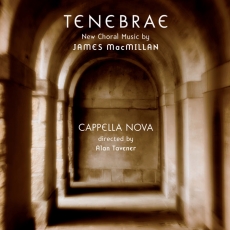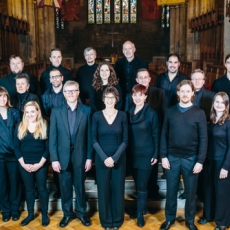MacMillan: Tenebrae - Cappella Nova - MusicWeb International
I will be writing this review wearing two ‘hats'. The first is as a listener-musician-reviewer. The second is as a choral director who can offer general comments about the music's accessibility.
That James MacMillan is a Christian and a Roman-Catholic is probably well known. He is a Dominican lay-worker and one who is willing to speak out in the press on subjects that he feels strongly about. I have always felt that in this age of almost militant atheism his was a voice "crying in the wilderness" able, as he is, to bring spirituality, liturgy and religious joy to the concert-hall. This can be heard in such masterworks as ‘Veni, Veni Emmanuel' and in ‘The World's Ransoming' for cor anglais and orchestra (1996). MacMillan writes about choral music in the fascinating booklet essay. Evidently it has been a part of his life since the early works such as the amazingly competent Missa Brevis recorded here and written mostly when he was seventeen. In recent times writing for choirs has reared its head again and he conducts one himself on a regular basis at St. Columba's Edinburgh. They gave a broadcast back in October 2007 which included a selection of his liturgical music.
He says that the seven Strathclyde Motets recorded here - and divided up on the CD by the Missa Brevis - are aimed at "good church choirs". They might have a medieval atmosphere as with the wonderful ‘In splendoribus sanctorum' at least in their use of fifths and open harmonies. However in that case the effect is blended with its crawling chords in a reminiscence of the last post in the shape of an off-stage trumpet magnificently handled by Mark O'Keefe. John Tavener is also not hundred miles away from this music. But there can also be great passion as in the magnificent opening to ‘Data est mihi' - an Ascension-tide Communion motet. MacMillan comments that he wants to convey a meditative atmosphere in these communion pieces but this work startles by its originality and emotional power.
The Missa Brevis is a teenage work with simple modal lines and clear counterpoint. These are contrasted with declamatory homophonic sections as in the Kyrie. The Gloria is a genuinely joyous and rhythmic inspiration reminding us of MacMillan's first influence, Kenneth Leighton. The Agnus dei is a fine setting communicating great feeling with a strong linear atmosphere often culminating in dark open fifths. This is a work which any cathedral choir should tackle sooner rather than later. Its mood would be suitable for a penitential season.
The Tenebrae responses are Holy week settings and were especially written for Capella Nova. They are deliberately challenging with their chromatic lines and require sustained singing and a full command of most modern choral techniques. MacMillan takes one text from each of the three ‘Nocturnes' which are set in their complete state by composers like Victoria and another Catholic, Edmund Rubbra. I love the humming sopranos in the first nocturne above the basses in low register; a quite incredible spacing is achieved. However I wonder if, being so prolific, MacMillan is not beginning to lose his inspirational touch. There are several moments in these Responsorials when I feel that we are just going through the motions.
With my choral conductor's and adjudicator's hat on, I must add that very few of the amateur choirs I have come across would be able or would want to tackle this music. Beautiful it is, but even the pieces which the composer might consider approachable are still too difficult. While drones underpin the harmonies, but in my experience basses get a bit fed-up with drones after a while. And why does everything have to be so slow. Again choirs, especially youngsters, want music with life and vitality. Quite deliberately, as he admits in the booklet, MacMillan likes to incorporate what I might call ululations, which are a sort of eastern-style ornamentation, in his melodic writing. Again, church choirs are hardly used to this and find it technically demanding and simply ‘weird'. And the fact that everything is unaccompanied with some quite challenging chords and close writing in the inner parts makes it all a major undertaking. Arguably it is beyond most conductors to bring this music off with success. In addition the broadcast mentioned above - which I know was heard by choral members I see regularly - was regarded by them as being ‘boring'. The composer MacMillan tells us that he envisages ‘Give me Justice' as a congregational item, yet although it might act as a responsorial it is not especially warm or pleasant enough for such a group to cope with.
The presentation of the whole CD is excellent. The booklet essay is a thoughtful idea that could be emulated elsewhere. It takes the form of a long interview between a choir member - the ideally named and enthusiastic Rebecca Tavener - and the composer. Each work is covered and we learn something about MacMillan's sources of inspiration. There is also a biographical sketch of MacMillan. All texts have been supplied.
If you recognize the name of the choir, Capella Nova and their conductor Alan Tavener then it may be because they fashioned a series of three pioneering recordings of the music of the Scots composer Robert Carver (d.1568). They were good then but they have marched on over the years and are now an extremely fine ensemble. These performances are a real joy and full of expression with a superbly balanced rich, creamy quality and a wondrous ability to sing piano. Just occasionally I would have liked the text to be more audible but overall James MacMillan must be thrilled with their efforts. In the booklets notes he acknowledges Robert Carver as a fellow Scot, and as a benign influence lingering just a little over his shoulder.

